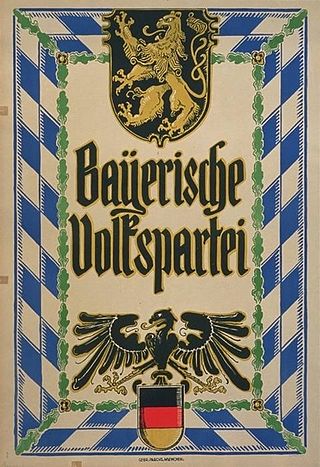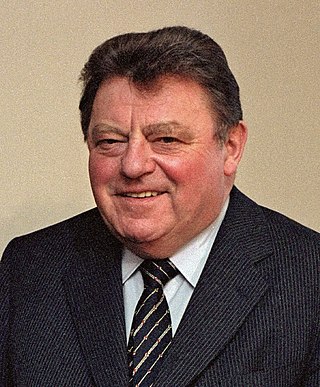
The Christian Social Union in Bavaria is a Christian democratic and conservative political party in Germany. Having a regionalist identity, the CSU operates only in Bavaria while its larger counterpart, the Christian Democratic Union (CDU), operates in the other fifteen states of Germany. It differs from the CDU by being somewhat more conservative in social matters, following Catholic social teaching. The CSU is considered the de facto successor of the Weimar-era Catholic Bavarian People's Party.

Wilhelm Johann Harald Hoegner was the second Bavarian minister-president after World War II, and the father of the Bavarian constitution. He has been the only Social Democrat to hold this office since 1920.

The Landtag of Bavaria, officially known in English as the Bavarian State Parliament, is the unicameral legislature of the German state of Bavaria. The parliament meets in the Maximilianeum in Munich.

The Bavarian People's Party was a Catholic political party in Bavaria during the Weimar Republic. After the collapse of the German Empire in 1918, it split away from the national-level Catholic Centre Party and formed the BVP in order to pursue a more conservative and particularist Bavarian course. It consistently had more seats in the Bavarian state parliament than any other party and provided all Bavarian minister presidents from 1920 on. In the national Reichstag it remained a minor player with only about three percent of total votes in all elections. The BVP disbanded shortly after the Nazi seizure of power in early 1933.

Hans Ehard was a German lawyer and politician, a member of the Christian Social Union (CSU) party.
The politics of Bavaria takes place within a framework of a federal parliamentary representative democratic republic, where the Federal Government of Germany exercises sovereign rights with certain powers reserved to the states of Germany including Bavaria.
Willi Ankermüller was a German politician and jurist. He represented the Christian Social Union of Bavaria (CSU), and was a member of the Landtag of Bavaria in the 1950s.

The 2013 Bavarian state election was held on 15 September 2013 to elect the 180 members of the 17th Landtag of Bavaria. It was held one week before the 2013 German federal election. The CSU regained the absolute majority it had lost in 2008, while the Free Democratic Party (FDP), a member of the outgoing governing coalition, fell below the 5% electoral threshold and lost all its seats. Minister-President Horst Seehofer continued in office.
Alfred Loritz was a German lawyer and politician who briefly rose to prominence in the immediate aftermath of the Second World War.
The Economic Reconstruction Union was a German political party that was active immediately in Allied-occupied Germany after the Second World War. Although usually translated into English as the Economic Reconstruction Union it is also sometimes known as the Union for Economic Reconstruction, the Economic Reconstruction Association, or the Economic Reconstruction Party.

Joachim Herrmann is a German politician. He is a member of the CSU party. Herrmann is an MP in the Landtag, the parliament of Bavaria since 1994. Since 16 October 2007 he has been Minister of the Interior of the state of Bavaria.

The 2018 Bavarian state election took place on 14 October 2018 to elect the 180 members of the 18th Landtag of Bavaria. The outgoing government was a majority of the Christian Social Union in Bavaria (CSU), led by Minister President Markus Söder.

Ursula Männle is a German Social sciences academic and politician (CSU). She served between 1983 and 1994 as a member of the Bundestag. More recently, between 2000 and 2013, she was a member of the Bavarian Landtag, chairing an important parliamentary committee and, till 2009, chairing the women's working group in the Landtag.

The 1986 Bavarian State Election was held on 12 October 1986 to elect members of the 11th Landtag of Bavaria. The Christian Social Union (CSU) led by Minister-President Franz Strauss retained its majority. The SPD fell below 30% of the vote for the first time since the 1954 state elections, while for the first time the Bavarian Greens won seats in the Landtag.

The December 1946 Bavarian state election was held on 1 December 1946 to elect the members of the First Bavarian Landtag. The election came after the dissolution of the Bavarian Constituent Assembly after the passing of the Constitution, which stipulated that a democratically elected Landtag would elect the Minister-President. It saw Bavaria's first democratically chosen Minister-President since Heinrich Held.

The 1954 Bavarian state election was held on 28 November 1954 to elect the members of the Third Bavarian Landtag. It is notable for being both the only time that a member of the SPD was elected as Minister-President, and the only time that the CSU was in the opposition.

The 1958 Bavarian state election was held on 23 November 1958 to elect the members of the Fourth Bavarian Landtag, and was notable for being held in the midst of the Casino Affair, which indicted several Bavarian politicians in the previous government on charges of corruption.
The Bavaria casino scandal refers to the political intrigue in Bavaria, Germany following the Bavarian Landtag's decision to issue casino licenses to private individuals between 1955 and 1962. Accusations of corruption decimated the Bavaria Party, which has been shut out of the Landtag since 1966.

The Second Söder cabinet is the current state government of Bavaria, sworn in on 12 November 2018 after Markus Söder was elected as Minister-President of Bavaria by the members of the Landtag of Bavaria. It is the 27th Cabinet of Bavaria.

The 2023 Bavarian state election will likely be held on 8 October 2023 to elect the 180 members of the 19th Landtag of Bavaria. The current government is a coalition of the Christian Social Union in Bavaria (CSU) and the Free Voters of Bavaria (FW) led by Minister-President of Bavaria Markus Söder.



















